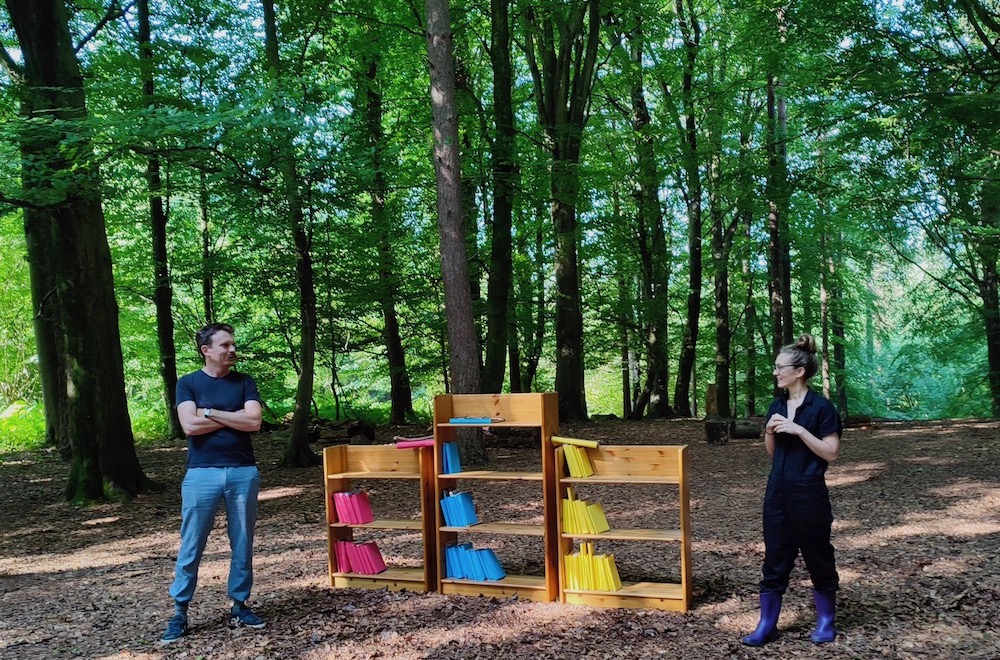
RDL Hosts Oliver Broadbent and Ellie Osborne guide participants through the Systems Bookcase model at Hazel Hill Wood, the site of the RDL residentials.
Introducing Cohort 4 of the Regenerative Design Lab, delivered in collaboration with Chatham House Sustainability Accelerator. Together, we are framing our work in this lab around the question ‘How to create policy that delivers regenerative design?‘
Over the course of this six-month, immersive programme we will:
- Explore how and why regenerative design addresses UK policy challenges,
- Experiment together to integrate regenerative design into policy steps, and
- Develop skills to communicate regenerative design to other people.
This edition of the Regenerative Design Lab aims to bring together regenerative practitioners interested in influencing the policy space with policy professionals interested in understanding how regenerative design can help address policy challenges. Practitioners may already be working in areas related to sustainability and interested in understanding how regenerative design thinking is different and what opportunities it represents.
Co-hosted at Chatham House, Hazel Hill Wood and online, this lab aims to be both explorative and transformative: discovering the potential of regenerative design thinking, and feeling what it means to step into this way of thinking.
This fourth edition of the Regenerative Design Lab builds on the theory base and findings established from the first three cohorts, enabling us to quickly bring clarity to our conversations about regenerative design.
While the focus of this cohort will be UK domestic policy, we will bring international perspectives to inform our work, and consider how UK practices might influence global communities, for example through supply chain, resources etc. Our intention is that broadening our awareness of global practice will provide a stepping stone to running a more internationally-focused cohort.
Delivered in partnership with Chatham House Sustainability Accelerator

Programme details
- Programme dates: 25th September 2024 – 6th May 2025
- Applications close: 30th June 2024; interviews July 2024 (dates tbc)
A part-time program is designed to complement existing work and is ideally suited for leaders and future leaders in policy, design and management of the built environment. If you are seeking to deepen your understanding of regenerative thinking, to collaborate with like-minded professionals and to influence the wider policy space, Cohort 4 is an excellent opportunity.
Outcomes and opportunities
As a participant in Cohort 4, you’ll gain valuable knowledge, skills, and experience, including:
- The ability to analyse existing policies and assess their potential for promoting regenerative design in the built environment.
- Experience in collaboratively developing policy recommendations that help to shift the built-environment sector from a paradigm of continuous growth to a regenerative paradigm.
- Confidence in engaging with stakeholders, advocating for regenerative design, and influencing policy decisions.
- Strategies for effectively communicating the benefits of regenerative practice to diverse audiences, including decision-makers and the general public.
Additionally, you’ll have the unique chance to:
- Connect with a network of policy and built-environment professionals who share your passion for exploring regenerative design.
- Access a toolkit of regenerative thinking approaches, enabling you to facilitate conversations around regenerative thinking in your organisation.
- Engage with leading experts and regenerative practitioners in the field, broadening your perspective and enriching your knowledge base.
- Experiment and explore within a supportive environment, accelerating your professional growth in the realm of sustainable policy and design.
- Immerse yourself in nature at Hazel Hill Wood, drawing inspiration from the ultimate regenerative, living system.
Session dates
- Session 1 | 24th September 2pm – 5pm | Face-to-face session | Chatham House
- Session 2 | 23rd October 11am – 24th October 3pm | Autumn residential (one night) | Hazel Hill Wood
- Session 3 | 26th November 9:30am – 12:30pm | Online session
- Session 4 | 17th December 9:30am – 12:30pm | Online session
- Session 5 | 8th January 11:00am – 10th January 3pm | Winter residential (two nights) | Hazel Hill Wood
- Session 6 | 4th February 2pm – 5pm | Face-to-face session | Chatham House
- Session 7 | 4th March 9:30am – 12:30pm | Online session
- Session 8 | 2nd April 11am – 3rd April 3pm | Spring residential (one night) | Hazel Hill Wood
- Session 9 | 7th May timings tbc | Final presentations | Chatham House
Around the time tabled sessions we ask participants to do around an hour a week of reflective work. Hopefully, the course will be relevant to what participants are working in their day jobs, so this reflection time should feel an extension of this work rather than something in addition to.
Fees
We offer three prices* for participation in the lab depending on your financial circumstances.
- 2400 + VAT – corporate/commercial/large organisation rate
- 1600 + VAT – public sector/NGO rate/small organisation rate
- 800 + VAT – self-funded/micro organisation rate
There are also a limited number of bursary places for people who identify as being from an underrepresented background, including but not limited to, BAME, LGBTQ+, disabled, refugee and asylum seekers. We will discuss this with you further at interview stage.
*The fees go to Constructivist and Hazel Hill to cover their costs for running this programme.
Application process for the Regenerative Design Policy Lab
The 20 places on cohort 4 are open to people working in or interested in the policy field around the built environment sector . You should be passionate about shifting engineering and construction away from a paradigm of growth and destruction and towards a paradigm of repair and renewal. We welcome applications from the public sector, industry, academia and supporting organisations. You need to have some body of experience to draw upon and the opportunity to explore and apply regenerative principles in practice. To assemble a balanced group of participants in the lab, we are asking interested participants to go through a simple application process.
While the official deadline was 30th June we are still taking applicants as we work through the shortlisting process in July. If you are shortlisted you will be invited to an informal interviewto help us understand more about you, your work, your interest, aims and hopes, and should take 20 – 30 minutes to complete.
Places will not be allocated based on ability to fund your participation. We will settle on a price that feels comfortable and feasible to you or your organisation, once you’ve been offered your place.
If you have any questions about the programme drop us an email.
Further information
Equity & Diversity
We seek to create safe and brave spaces for participants from diverse backgrounds and lived experience to engage in learning together through the Lab. We want to welcome and support anyone with a strong intention to take part in the Regenerative Design Lab, and aim to ensure that identity or background will not be a barrier.
It is important to acknowledge the responsibility and power that comes with our role as a convenor and learning provider, and we are constantly striving to improve and embed equity, inclusion, anti-oppression at the heart of our programmes.
Accessibility
If you will need additional support for your wellbeing or access needs, then please let us know as soon as possible, so we can ensure we have factored this into our planning and design of our sessions. You can let us know in the application form or email us – we are happy to arrange a call to discuss how we can support your learning.
Time commitment
Online sessions: 3 hours
Residential stays at Hazel Hill: October and April residential involve one overnight stay; the January residential is two-night stay.
Additionally we recommend 4 hours or more per month dedicated to your personal project or challenge, further learning, connecting with the group and action inquiry.



